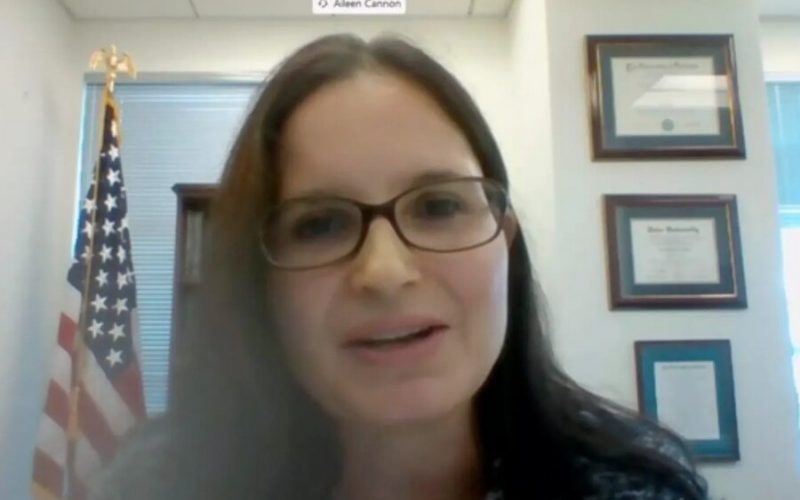The judge presiding over the case involving former President Donald Trump’s classified documents in Florida approved a motion on Wednesday for an amicus brief, urging the court to deny Trump’s request to dismiss the indictment.
A group of former prosecutors, elected officials, government figures, constitutional lawyers, and organizations submitted an amicus curiae brief, urging Judge Aileen Cannon to deny the former president’s motion to dismiss the case on the grounds that special counsel Jack Smith’s appointment was illegal and the funding was improper.
The argument of attorneys Matthew Seligman and Cristina Alonso, representing the group, hinges on whether Mr. Smith was duly appointed as an “inferior officer” under powers granted to Attorney General Merrick Garland by the Appointments Clause of the U.S. Constitution to “appoint officials … to detect and prosecute crimes against the United States.”
“Defendant Donald J. Trump and his amici contend that the appointment of Special Counsel John ‘Jack’ Smith is unlawful. That contention is demonstrably incorrect,” their brief reads.
The attorneys argue the U.S. Constitution and laws enacted by Congress “unmistakably establish the lawfulness of Special Counsel Smith’s appointment.”
In February, President Trump submitted multiple motions aiming to dismiss the Mar-a-Lago classified documents case. One of his arguments was that Mr. Smith “lacks the authority” to pursue the case, among other points.
Attorneys for the former president contend that neither the U.S. Constitution nor Congress had officially established the special counsel’s office, rendering Mr. Smith’s appointment invalid.
Furthermore, they argue that the special counsel’s office is being funded “off the books” by the Biden administration.
The motion, referencing the Appointments Clause, contends that the attorney general exceeded their authority by appointing a “like-minded political ally” as special counsel “without Senate confirmation.”
At most, Mr. Smith is an employee and not an “officer” under the statutes Mr. Garland cites in making his appointment, the former president’s attorneys argue.
President Trump’s legal team contends that the only solution is to dismiss the superseding indictment.
Following the filing of those motions to dismiss, the court granted three amicus curiae briefs in March filed in support of President Trump’s motion to dismiss.
The court found those briefs brought the court’s attention to a “relevant matter that may be of considerable help to the Court in resolving the cited pretrial motions.”
But in their brief filed on Wednesday, Mr. Seligman and Ms. Alonso argue that the former president’s motion to dismiss makes arguments that “are wholly without merit” and that the three amici briefs supporting the former president’s motions to dismiss “are mutually inconsistent” in their positions.
Among the amici briefs, was a filing by Texas law professor Josh Blackman, who argued in March that Mr. Smith’s temporary position is at most “a mere employee,” making his actions unlawful.
Mr. Smith has described himself in a brief as an “inferior officer of the United States.”
“Simply being appointed by a department head does not elevate that position to the status of an inferior ‘Officer of the United States.’ Indeed, the mere fact that a person is appointed by the Head of a Department does not make that position an office at all,” Mr. Blackman wrote.
He argued that Mr. Smith’s position as special counsel “is not continuous” as precedent requires, and therefore “it cannot be an office of any type.”
“In this case, Mr. Smith’s actions as a notionally independent United States attorney are beyond the scope of what the Supreme Court has permitted, and therefore, his actions are unlawful,” the law professor wrote.
The Appointments Clause stipulates that all federal offices, except for the president’s, must be established by Congress and appointed with the advice and consent of the Senate.
President Trump’s motion to dismiss argues that there is no such “statute establishing the Office of Special Counsel.”
“As a result,” Trump’s motion reads, “because neither the Constitution nor Congress have created the office of the ‘Special Counsel,’ Smith’s appointment is invalid and any prosecutorial power he seeks to wield is ultra vires,” meaning beyond his authority.
Mr. Smith’s brief has dismissed these arguments as “confused contentions,” stating, “the Court should promptly reject this legally unsupportable challenge to the Special Counsel’s authority to prosecute Mr. Trump.”
Judge Cannon gave President Trump’s lawyers and the special counsel until April 17 to respond to the amicus brief.
Mr. Garland appointed Mr. Smith as special counsel on Nov. 18, 2022, to “prosecute federal crimes arising from the investigation” into President Trump’s handling of classified documents seized from his Mar-a-Lago estate in Palm Beach.
Share your thoughts by scrolling down to leave a comment.


Judge Cannon will dismiss the case based on these briefs, which will also affect the DC case. I expect the Supreme Court will ultimately have to decide the issue. It will, and Smith will lose again.